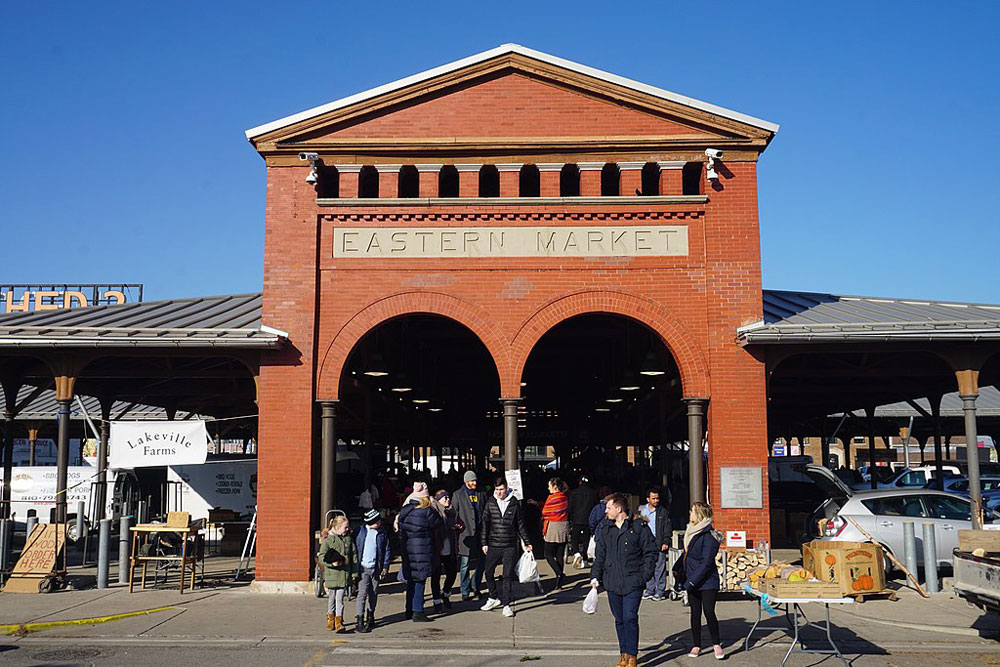
May 19, 2020; Model D
In Detroit, the Eastern Market Partnership is a nonprofit that manages the famed historic Eastern Market on behalf of the City of Detroit. As NPQ’s Rick Cohen observed six years ago, “Established in 1891, the market is a collection of fruit, vegetable, meat, and flower producers and vendors. Located about a mile northeast of downtown Detroit, Eastern Market draws thousands of visitors and customers.”
When the pandemic hit, the initial impact was devastating. As Dorothy Hernandez writes in Model D, “The market can see as many as 45,000 visitors on a Saturday. But since the pandemic has brought even the most routine things like food shopping to a grinding halt in Michigan and across the country, the numbers have dropped dramatically.”
“At first when the [statewide shutdown started], we weren’t hitting past 400 shoppers on a Saturday,” market manager Lonni Thomas tells Hernandez. “I’ve never seen a Saturday market that dead; even during a blizzard we hit 2,000 people.”
And yet, the marketplace has carried on. One factor has been the tenacity of its vendors. For example, Sheryl Gregoire from the People’s Pierogi Collective has been a vendor at Eastern Market since 2008. She comes every Saturday selling pierogi, from potato to jalapeño poppers. Ready-to-eat sales are down 75 percent, but she’s keeping the business running.
“We have to support the market,” says Gregoire. “If all the vendors stopped calling coming, then people stop coming. So, I think it’s really important to keep going in and support the market and be there for them.”
And, as Hernandez explains, many vendors, and even the market itself, “have adapted and pivoted in the wake of the novel coronavirus that has swept through the country.” These innovations have included the development of a Tuesday drive-through market and a Saturday farm box program. Gregoire says while her ready-to-eat sales have fallen, her frozen pierogi sales are steady, and she has also added online ordering for Saturday pickup. All told, together she is able to keep her business going.
The farm box program has turned out to be an “exploding marketplace,” says Caroline Michniak, Grow Eastern Market program manager. The first time around, 50 orders were placed for the boxes, which feature staple produce from local farmers, such as potatoes, onions, and beets, with extras like parsley seeds or hemp hearts. Shoppers can also add artisanal bread, meat, eggs, and other specialty products. Now the box is consistently selling out as quickly as a few hours of going live on the website, with orders averaging a total of 325 boxes.
Sign up for our free newsletters
Subscribe to NPQ's newsletters to have our top stories delivered directly to your inbox.
By signing up, you agree to our privacy policy and terms of use, and to receive messages from NPQ and our partners.
The Tuesday bulk drive-through pick up service has also been wildly successful. The first week the service was offered on March 24th, 30 cars lined up. By the fifth week, there were hundreds of cars lining up and waiting as long as three hours.
As market manager, Thomas had, before the pandemic, focused on non-food markets like the Sunday makers market. Now her focus has shifted to food access programs, community-based projects, and the market’s Tuesday bulk pickup program, where shoppers can check out a list of items and businesses ahead of time, and then drive up to the businesses to purchase their goods and load them in their cars.
The bulk pickup is slated to end at the end of May, according to Thomas, since retail Tuesday markets will begin on June 2nd. But the nonprofit is looking to continue its new online ordering and curbside service practices.
Dan Carmody is president of the Eastern Market partnership. He explains to Hernandez that, “Our mission at Eastern Market is to support local businesses but to do it in a way that’s safe for our vendors, our staff, and our customers. And so just as we’ve done with developing the drive-through Tuesday market or Saturday food box program where people can get the goods they need with limited human contact, we feel compelled to develop those formats.”
Under COVID-19, food access has been a key priority, which is why the Saturday market stayed open. “Even when we only have 15–20 vendors on site,” Carmody says. “they were food essential, [providing] essential needs of the people.”
In addition to the market programs, the partnership has launched other initiatives that address food access, such as distributing boxes to senior centers and dropping off fresh produce to local organizations like Alternatives for Girls, which serves homeless and at-risk girls and young women.
There will be many lingering effects of the pandemic on the food market. “Social distancing is going to be around for a while, and we have to be prepared to better manage them. So, to that extent, some of these new forms of commerce will stick,” says Carmody.
Carmody adds, “Pieces of these programs will more than likely survive in probably somewhat different formats than we’re doing today. We were trying these things, sometimes from one week to the next. And so, you just try stuff in times of crisis, and you learn from it; you try to do better the next week. And that’s the spirit that will continue as we work through this.”—Steve Dubb












